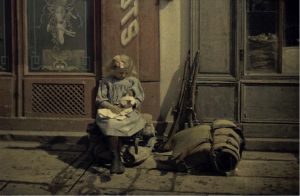Wilhelmina Tobias: War and Memory
Wilhelmina Tobias remembers ‘…that fateful August week in 1914, [when] crying women took leave of sons and husbands’ and within a few months Wilhelmina was also hugging her father goodbye. Amongst Wilhelmina’s recollections of her childhood are a number of references and one large passage dedicated to the First World War. ‘Known […] as The Great War’ to Wilhelmina, she was a child during the period of wartime from 1914-1918 and was limited in her exposure to the war. Her life was occasionally directly affected by it however, including the loss of her father and Zeppelin air raids.

Despite being a childhood memoir, by living in the North East of England Wilhelmina was in the unusual position of experiencing the war first hand whilst still on British soil. The first mention of war sees Wilhelmina spotting a Zeppelin on the way home from her Aunt’s. Strategic bombing campaigns by the Germans during the First World War were an unexpected occurrence and Wilhelmina describes the lack of preparation taken to combat such attacks on mainland infrastructure. The memoir outlines this stating; ‘There were no air-raid warning sirens in that war. We only knew when the gas went out quickly as opposed to dimming slowly when the meter needed a penny.’ She describes seeing the ‘…long cigar shaped object shining silver in the moonlight’ before rushing home and being scolded by her Granny for her vivid imagination, reinforcing the general disbelief that such an attack could take place.

Thomas Fagan likely describes the very same attack that Wilhelmina is referring to, in his book The Baby Killers: German Air Raids on Britain in the First World War. Taking place on the 16th June 1915, an L10 Zeppelin piloted by Kapitanleutnant Hirsch of the German Luftwaffe navigated the North Sea in the first air raid attack to use radio bearings as a navigational aid. Fagan describes the targeted factories as being ‘brightly lit up, inviting attack’ whilst the defences included ‘no searchlights and the only fire directed against the raider came from an old cruiser guarding the mouth of the Tyne […] which was ineffectual.’ Although the weather and night flying often made aiming difficult, Hirsch made the most of the favourable conditions to first target Wilhelmina’s own Wallsend, in particular the Eastern Marine Engineering Works, before targeting ‘Palmer’s shipyard across the river at Jarrow.’ Half an hour later Hirsch departed southwards reporting that the glare from the fires was visible ’30 nautical miles away.’

Wilhelmina gives a rather understated account of what was surely a dramatic night, giving no indications as to her own emotional state. Instead she describes the scene as her family ‘all sat huddled together in candle-light listening to the thud-thud of bombs being dropped’ seeming to delight in getting one over the same Granny who had scolded her earlier, who had to ‘eat her words’, rather than show concern or fear. This lack of personal insight is something that recurs throughout the memoir so it is difficult to really get a feel for Wilhelmina’s attitude towards the war from this passage.
Wilhelmina was also affected by war in a more traditional way when her father joins the army upon hearing of atrocities committed by German soldiers on ‘helpless’ Belgian women and children. She is likely referring here to the ‘Rape of Belgium’ and the subsequent Bryce report commissioned by the British government. It included elaborate details and first-hand accounts, including excerpts from diaries and letters found on captured German soldiers. The Report was a major factor in changing public opinion in neutral countries, especially the United States. Wilhelmina includes the rather curious statement that it was ‘(the most effective recruiting gimmick of all time)’. The usage of the word gimmick is instructive on how Wilhelmina subsequently perceived the quality of information being released to the public during this time. Although evidence of German wrongdoing was uncovered, during the 1920’s the Bryce report was dismissed as highly exaggerated wartime propaganda that had relied too heavily on unproven sources and distorted interpretations of diaries, evidently affecting Wilhelmina’s opinion until the day she wrote the memoir.

Wilhelmina’s father was in France within three months, a ludicrously short amount of training before fighting in a war. Pre-war calculations had supposed that the British Expeditionary Force would suffer losses of 40% within the first six months of fighting though this was a gross miscalculation. An initial BEF force of 85,000 was entirely wiped out within 3 months. Recruiting went into overdrive and training times shortened, and surely enough casualty rates rose as inexperienced soldiers were sacrificed in the trenches for literally metres of ground. Wilhelmina’s father was shot down by a sniper on the 11th of March 1915, aged 32. Wilhelmina describes a telegraph boy bringing the news to their door, and subsequently his ‘pitifully few effects’ were returned along with two letters addressed to her. By her own admission, the care-free part of her childhood ended with this news and so does the memoir, ending poignantly with the last sentence of the letter her father sent her from the front line:
‘“The little French girls are having a terrible time and when you pray for your daddy tonight, thank God you were born a little English girl”’
Works referenced
Fagan. T, (2013). The Baby Killers: German Air Raids on Britain in the First World War, 1st Edition, Pen and Sword, London p172-174.
Tobias, Wilhelmina, Childhood Memories, MS pp.22 (c, 5,000 words). Brunel University Library.
Quinn. P J, (2001). The Conning of America: The Great War and American Popular Literature, 1st Edition, American Literature, New York, p39-40.
Wilson. T, (1979). Lord Bryce’s Investigation into Alleged German Atrocities in Belgium, 1914–1915: Journal of Contemporary History 14:3 p369–383.
Images hosted by
Fig1 http://www.newmp.org.uk/memimages/South%20Tyneside%201/Jarrow%20J2/MAP%20OF%20AIRSHIP%20RAIDS%20TYNESIDE%2014%20APRIL%20AND%2015TH%20JUNE%201915.jpg
Fig2 http://www.crichparish.co.uk/WW1roll/WW1IMAGES/zeppelin.jpg
Fig3 http://www.newmp.org.uk/memorial_image.php?contentId=7786
Fig4 http://www.theblaze.com/wp-content/uploads/2013/01/Rheims-The-Marne.-France-1917.jpg

Leave a Reply